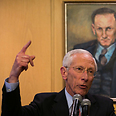
A spike in home prices the past few years has been a major concern for policymakers. Still, the central bank has continued to lower interest rates to support a weakening economy, while instead opting to tighten mortgage restrictions for banks in a hope price gains slow.
Fischer in a speech said the public – which is upset at the increasing prospect of unaffordable housing – is constantly asking whether the Bank of Israel would raise rates to tackle the problem of housing prices.
"Interest rates influence a range of variables in the economy – the exchange rate, the level of investments and more," he said. "If we raise the interest rate only to deal with housing prices, we will cause an appreciation (in the shekel) and slower growth."
The main problem is supply, Fischer said, urging the government to further allocate land to boost housing starts.
"What we cannot do is use the interest rate tool, which is a tool that affects the entire economy, just to tackle housing prices."
Despite a jump in housing prices, overall inflation is tame at an annual rate of 1.5% in January, well within a government target of 1-3%. The low inflation level is partly attributed to slowing demand as growth weakens.
Growth this year is projected at 2.8% excluding natural gas production, down from 3.2% in 2012.
The Bank of Israel last week held its benchmark interest rate at 1.75% for a second straight month after rate reductions in September and December.















